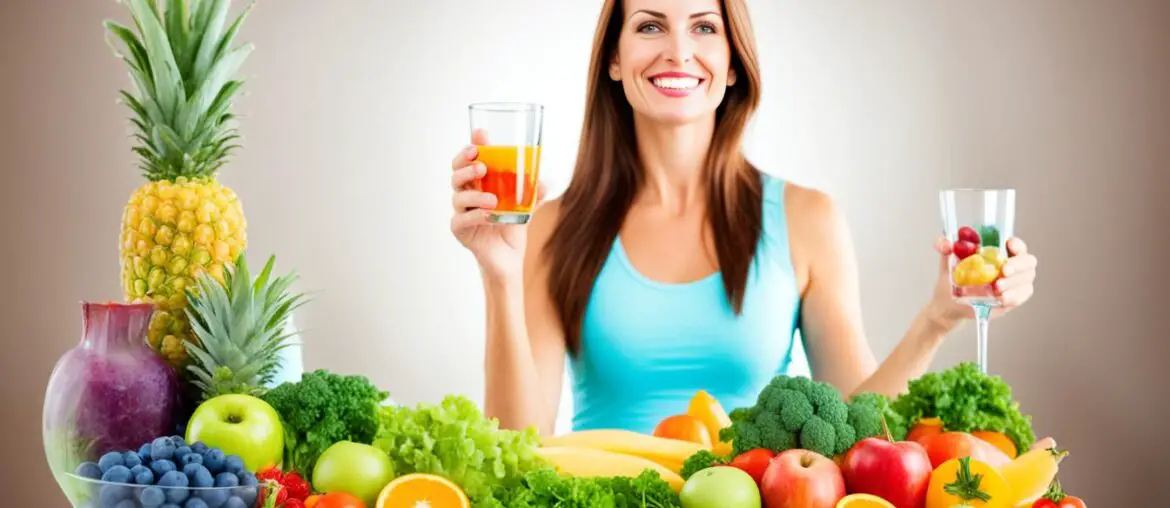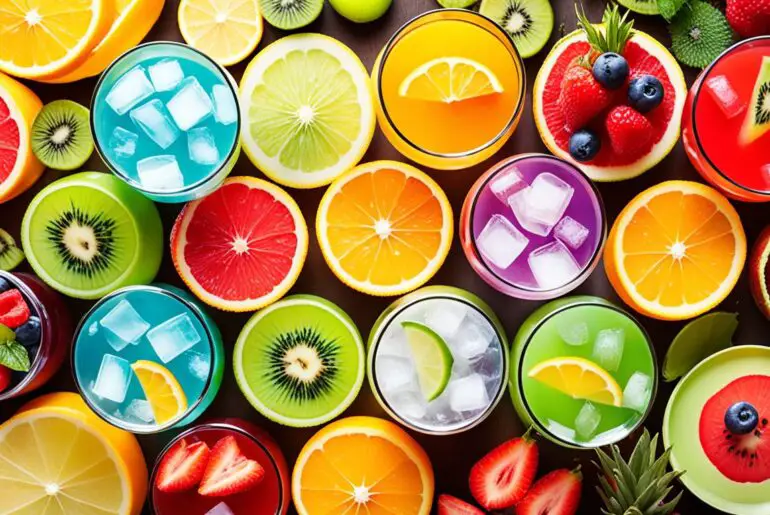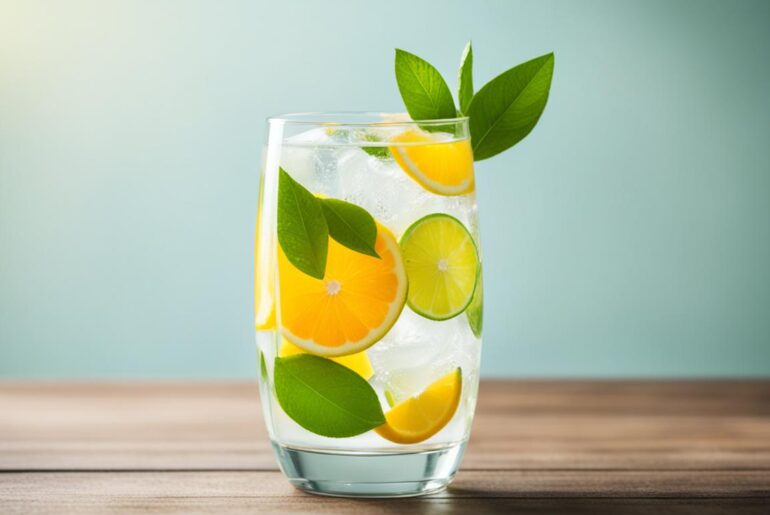Are you following the HCG diet and wondering how to stay properly hydrated? Maintaining healthy drinking habits is crucial for your overall well-being and weight loss success while on the HCG diet. Let’s explore the importance of hydration and discover some tips for staying properly hydrated during your weight loss journey.
Key Takeaways:
- Proper hydration is essential for optimal bodily function and weight loss success on the HCG diet.
- Water is the best option for hydration, but other non-caloric beverages like tea and coffee without cream or sweeteners can also be enjoyed.
- Avoid artificial sweeteners and choose the right containers for drinking water to stay healthy while on the HCG diet.
The Importance of Hydration on the HCG Diet
Hydration is crucial while on the HCG diet as it plays a vital role in the body’s detoxification process and overall well-being. Proper hydration facilitates the elimination of toxins from the body, allowing for efficient detoxification. When cells are well-hydrated, they are more effective at flushing out these harmful substances compared to dehydrated cells. By staying properly hydrated, you can support your body’s natural detoxification mechanisms and promote optimal weight loss.
In addition to detoxification, adequate hydration on the HCG diet brings other benefits. It helps combat common side effects like fatigue and headaches that may occur during the initial phases of the diet. When your body is well-hydrated, it functions optimally, which can lead to improved energy levels and reduced discomfort.
Facilitating Nutrient Transport
Furthermore, staying hydrated is essential for ensuring the efficient transport of nutrients to your cells. Hydration plays a crucial role in digestion, absorption, and circulation. When you consume food, water helps break it down and aids in the absorption of nutrients in the digestive system. Properly hydrated cells allow for the effective transport of these nutrients throughout your body, contributing to enhanced energy levels and overall bodily function.
To stay adequately hydrated on the HCG diet, it is recommended to consume a gallon of water or roughly 4 liters daily. Distribute your water intake evenly throughout the day and establish a habit of sipping water consistently to maintain hydration levels. Remember that individual hydration needs may vary, so listen to your body and adjust your water intake accordingly.
| Hydration Benefits on the HCG Diet | Recommended Actions |
|---|---|
| Facilitates toxin elimination | Aim to consume a gallon of water (about 4 liters) daily. |
| Reduces fatigue and headaches | Establish a habit of sipping water consistently throughout the day. |
| Supports nutrient transport | Listen to your body and adjust water intake based on individual needs. |
In conclusion, proper hydration is crucial for your success on the HCG diet. It promotes the elimination of toxins, reduces common side effects, and ensures the effective transport of nutrients. Remember to prioritize consistent and adequate water intake to support your overall well-being while following the HCG diet.
Hydrating Beverage Options on the HCG Diet
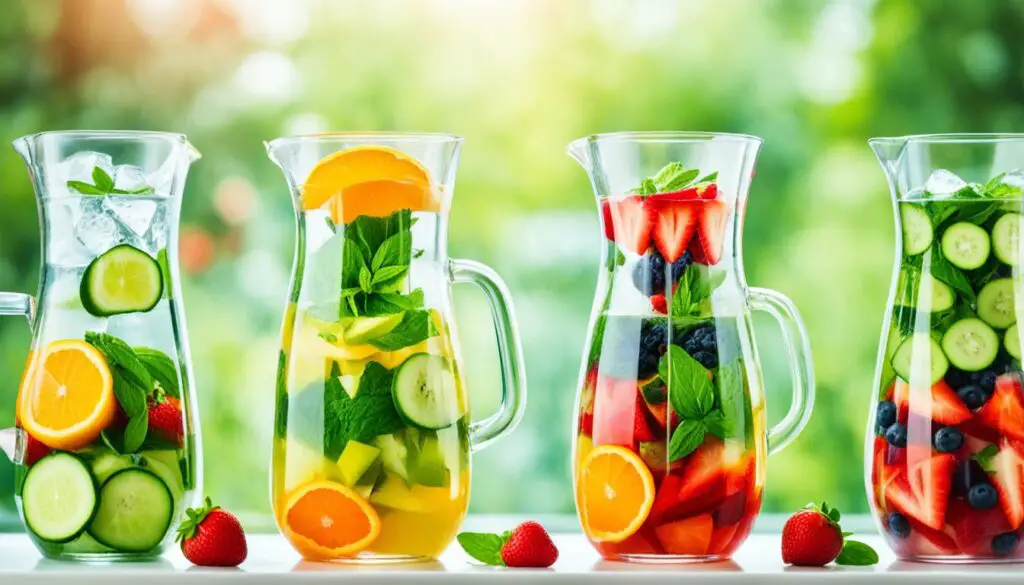
When it comes to staying hydrated on the HCG diet, water is undoubtedly the best option. However, there are other hydrating beverages that can be enjoyed while on this diet. By incorporating a variety of non-caloric drinks into your daily routine, you can enhance your hydration levels and add some flavor to your menu.
Tea and Coffee
Both tea and coffee can be consumed on the HCG diet, as long as they are enjoyed without any added cream or sweeteners. These beverages can be a great way to start your day or enjoy a warm and comforting moment throughout the day. Stick to black teas, herbal teas, and plain coffee to ensure that you’re getting the full benefits of these beverages without any additional calories or sugar.
Sparkling Water
If you’re looking for a refreshing and effervescent treat, sparkling water is an excellent choice. It provides the sensation of drinking a carbonated beverage without the added calories or sugars. You can enjoy plain sparkling water or opt for flavored varieties that are free from sweeteners and additives.
Iced Tea
On hot summer days, a glass of cold iced tea can be incredibly satisfying. To make it HCG-friendly, brew your tea without adding any sweeteners. You can also experiment with different flavors like citrus or herbal infusions to create a refreshing and flavorful drink. Alternatively, consider trying out the “sun tea” method, where you steep tea bags in a glass jug under the sun for a few hours. This method infuses the tea with a smooth and subtle taste.
| Beverage | Advantages |
|---|---|
| Water | Essential for hydration |
| Tea and Coffee | Warm, comforting, and varied flavors |
| Sparkling Water | Refreshing and calorie-free |
| Iced Tea | Cold, flavorful, and customizable |
As you can see, there are plenty of hydrating beverage options available for those following the HCG diet. By incorporating these drinks into your daily routine, you can stay properly hydrated while enjoying a variety of flavors. Just remember to avoid any added creams, sweeteners, or artificial additives to ensure that your beverage choices align with the guidelines of the HCG diet.
Safe Drinking Containers for the HCG Diet
When following the HCG diet, it is important to consider not only what you drink but also the containers you use to drink from. The choice of drinking containers can have an impact on your health and well-being. To ensure safety and purity during the HCG diet, it is recommended to avoid plastic containers and opt for refillable glass or stainless steel containers instead.
Plastic containers, especially those made from low-quality materials, have the potential to leach harmful chemicals and petroleum into the water. These chemicals can disrupt hormonal systems and pose a risk of cancer. By choosing refillable glass or stainless steel containers, you can eliminate the risk of harmful substances contaminating your drinking water.
Investing in a high-quality water filter for your home can further enhance the purity of the water you consume while on the HCG diet. A water filter effectively removes impurities and contaminants, ensuring that you are drinking clean and safe water throughout the diet.
By prioritizing the use of safe drinking containers and filtered water, you can support your hydration and overall health goals on the HCG diet.
The HCG Diet and Caloric Restriction
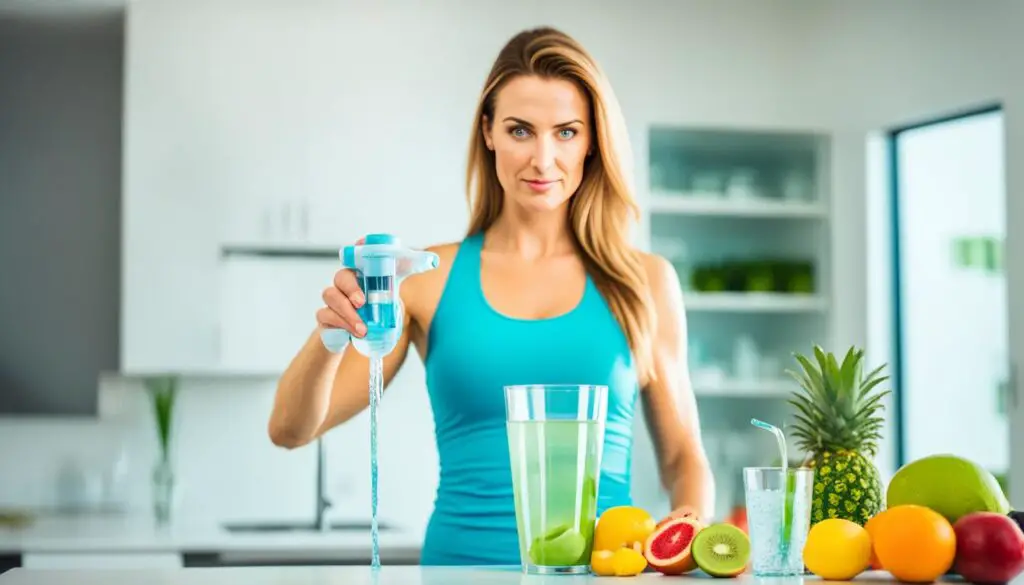
The HCG diet is a weight loss plan that incorporates caloric restriction as a key component. During the weight loss phase of the diet, individuals are required to consume either 500 or 800 calories per day, depending on their specific plan. This extreme calorie reduction is intended to promote rapid weight loss and stimulate the body’s metabolism.
By restricting caloric intake, the HCG diet aims to create a calorie deficit, forcing the body to rely on stored fat for energy. This process can lead to significant weight loss over a relatively short period.
However, it is important to note that such a low-calorie diet can induce feelings of hunger and deprivation. It is essential to closely monitor hunger levels and ensure proper nourishment while on the diet. Consulting with a healthcare professional or registered dietitian is recommended to ensure nutritional needs are met.
The HCG diet is divided into three phases: the loading phase, the weight loss phase, and the maintenance phase. During the weight loss phase, specific foods are allowed, including lean proteins, approved vegetables and fruits, and seasonings. The diet discourages the consumption of dairy products, high-carb foods, fats and oils, as well as sugary foods and desserts.
The HCG Diet Phases:
- Loading phase: This initial phase involves consuming a high-calorie diet for a few days to build up fat stores.
- Weight loss phase: Individuals follow the low-calorie diet while receiving HCG injections or supplements. This phase typically lasts for several weeks.
- Maintenance phase: After the weight loss phase, individuals gradually increase calorie intake and reintroduce certain foods while maintaining their achieved weight loss.
It is important to note that the HCG diet should only be followed under the guidance of a healthcare professional. Extreme calorie restriction diets can pose risks and may not be suitable for everyone. Additionally, it is crucial to address the underlying factors contributing to weight gain and to adopt long-term sustainable lifestyle changes for lasting weight loss success.
HCG Diet and Caloric Restriction
| Phase | Caloric Intake | Allowed Foods | Restricted Foods |
|---|---|---|---|
| Loading phase | Varies (high-calorie) | Diverse range | N/A |
| Weight loss phase | 500 or 800 calories per day | Lean proteins, approved vegetables and fruits, seasonings | Dairy products, high-carb foods, fats and oils, sugary foods, desserts |
| Maintenance phase | Gradual increase from weight loss phase | Expanded range, reintroduction of certain foods | N/A |
The HCG diet, with its focus on caloric restriction, can lead to significant weight loss. However, it is important to approach this diet with caution and under the guidance of a healthcare professional. Prioritizing nutrient-dense foods and addressing hunger and nutritional needs are essential aspects of ensuring a safe and successful weight loss journey.
Meal Structure on the HCG Diet
When following the HCG diet, it’s important to carefully plan and structure your meals to adhere to the guidelines and recommendations of the diet. The meal structure on the HCG diet is designed to support weight loss while providing adequate nutrition and energy. Here is an overview of the meal structure and guidelines:
Morning Beverage
Begin your day with a cup of coffee or tea, sweetened with stevia or saccharine. You can add a maximum of one tablespoon of milk to your beverage. This small addition can help enhance the flavor without significantly impacting your calorie intake.
Lunch and Dinner
The main meals on the HCG diet consist of lean proteins, such as chicken, egg whites, white fish, extra-lean beef, and bison. These protein sources are low in calories and fat, making them ideal for weight loss. Aim to consume approximately 250 calories at each meal.
Vegetables, Fruits, and Seasonings
While following the HCG diet, specific vegetables and fruits are allowed in limited quantities. These include options such as lettuce, spinach, tomatoes, cucumbers, strawberries, oranges, and apples. It’s crucial to carefully measure and portion these foods to ensure you stay within the recommended calorie range.
Seasonings such as herbs, spices, salt, and pepper can be used to add flavor to your meals. However, be mindful of portion sizes and avoid condiments that contain added sugars or unhealthy fats.
Excluded Foods
There are certain foods that are not permitted on the HCG diet. This includes dairy products, high-carb foods, fats and oils, and sugary foods and desserts. These foods are typically high in calories and can hinder weight loss progress. It’s important to strictly adhere to these guidelines to achieve desired results.
To help you visualize the meal structure on the HCG diet, here is a table summarizing the key points:
| Meal | Recommended Foods |
|---|---|
| Morning Beverage | Coffee or tea sweetened with stevia or saccharine, maximum one tablespoon of milk |
| Lunch | Lean proteins (chicken, egg whites, white fish, extra-lean beef, bison) |
| Dinner | Lean proteins (chicken, egg whites, white fish, extra-lean beef, bison) |
| Vegetables and Fruits | Limited quantities of approved options (lettuce, spinach, tomatoes, cucumbers, strawberries, oranges, apples) |
| Seasonings | Herbs, spices, salt, pepper (avoid condiments with added sugars or unhealthy fats) |
| Excluded Foods | Dairy products, high-carb foods, fats and oils, sugary foods and desserts |
Following the meal structure on the HCG diet is crucial for achieving the desired weight loss results. It’s important to consult with a healthcare professional or registered dietitian before starting any restrictive diet plan to ensure it is safe and suitable for your individual needs.
The HCG Diet and Hormonal Injections
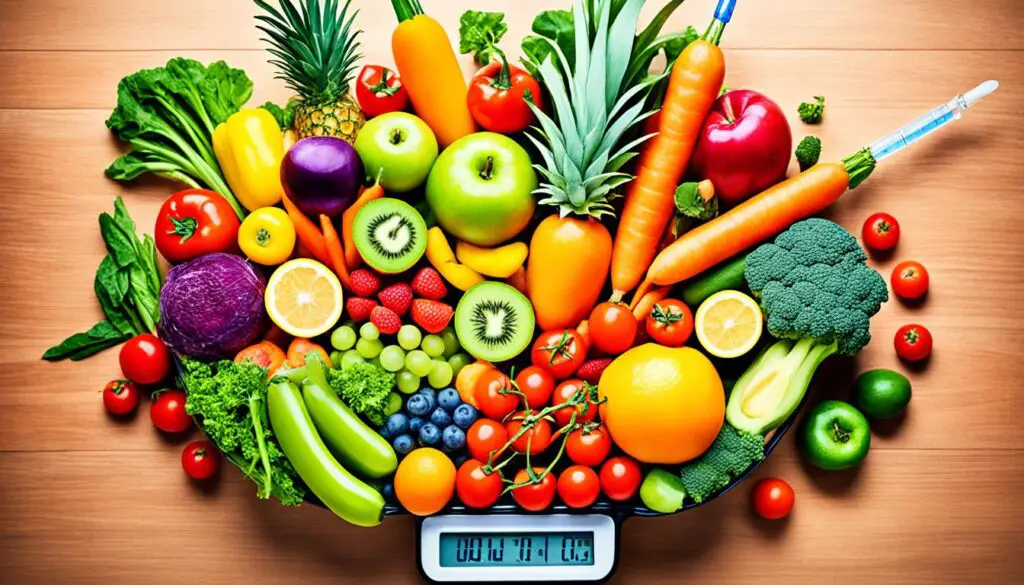
The HCG diet is a weight loss plan that incorporates the use of hormonal injections or supplements containing Human Chorionic Gonadotropin (HCG). It is important to note that the use of HCG for weight loss is not approved by the FDA and is considered illegal. The weight loss achieved on the HCG diet is primarily attributed to the extreme calorie restriction rather than the effects of the HCG hormone itself.
While the HCG hormone is naturally produced during pregnancy, its role in weight loss is controversial and lacks scientific evidence. The hormone is believed to suppress hunger and promote the utilization of stored fat as an energy source. However, these claims have not been substantiated, and the weight loss achieved on the HCG diet is mostly due to the severe calorie restriction of 500 to 800 calories per day.
It is crucial to prioritize safety when considering the HCG diet or any other weight loss plan. Consulting with a healthcare provider before starting the HCG diet is highly recommended to evaluate potential risks and ensure appropriate monitoring throughout the journey. A healthcare professional can provide guidance on safer and more sustainable weight loss options tailored to individual needs and goals.
Key Points:
- The HCG diet incorporates hormonal injections or supplements containing HCG for weight loss.
- The use of HCG for weight loss is not approved by the FDA and is considered illegal.
- The weight loss achieved on the HCG diet is primarily due to extreme calorie restriction.
- Consulting with a healthcare provider before starting the HCG diet is crucial for safety and guidance.
Potential Risks and Considerations of the HCG Diet
The HCG diet is not recognized as safe by health experts and is considered highly unsafe, unhealthy, and illegal. The extreme calorie restriction and potential for prolonged hunger can lead to adverse effects such as headaches, fatigue, and dizziness. The restriction of entire food groups can result in nutrient deficiencies. Additionally, the use of over-the-counter HCG supplements lacks oversight and can be potentially harmful. It is important to consider safer and more sustainable weight loss options.
“The HCG diet is not recommended by healthcare professionals due to its extreme calorie restriction and potential for nutrient deficiencies.”
– Dr. Emily Johnson, Registered Dietitian
The HCG diet’s significant caloric restriction puts the body at risk of nutrient deficiencies, which can lead to various health problems. Vitamins, minerals, and other essential nutrients are vital for normal bodily functions and overall well-being. Restricting intake of certain food groups can make it challenging to consume an adequate variety of nutrient-rich foods. This can result in deficiencies of vitamins (e.g., vitamin D, vitamin B12), minerals (e.g., iron, calcium), and other essential nutrients.
In addition to nutrient deficiencies, the HCG diet may also contribute to disordered eating patterns. The strict rules and restrictions can foster an unhealthy relationship with food and a distorted perception of hunger and satiety cues. The potential for long-term disordered eating habits and negative associations with food can have lasting effects on mental and emotional well-being.
It is important to note that the use of over-the-counter HCG supplements is not regulated by the FDA. The safety, effectiveness, and quality of these products cannot be guaranteed. Without proper medical supervision, individuals may be at risk of adverse side effects and potential interactions with other medications or health conditions.
Potential Risks and Side Effects of the HCG Diet:
- HCG Diet Risks: The HCG diet is considered highly unsafe and unhealthy by health experts.
- HCG Diet Side Effects: Adverse effects such as headaches, fatigue, and dizziness can occur due to extreme calorie restriction.
- Disordered Eating on HCG Diet: The strict rules and restrictions of the diet can contribute to the development of disordered eating patterns.
- HCG Diet Nutrient Deficiencies: The restriction of entire food groups can lead to deficiencies of essential nutrients.
Consider Safely Guided Alternatives:
If you’re looking for a safe and effective way to lose weight, it is recommended to consult with a healthcare professional or a registered dietitian. They can provide personalized guidance and develop a well-balanced eating plan that suits your individual needs and goals. Remember, sustainable weight loss is achieved through healthy lifestyle changes rather than extreme and potentially dangerous diets.
Conclusion
Maintaining healthy drinking habits on the HCG diet is crucial for optimal hydration and successful weight loss. As I mentioned earlier, water should be your primary choice for hydration. However, you can also enjoy other non-caloric beverages like tea and coffee without cream or sweeteners.
It is important to avoid artificial sweeteners as they can affect insulin levels and appetite control. Additionally, when it comes to drinking water, choosing the right containers is vital. Opt for refillable glass or stainless steel bottles instead of plastic to avoid potential health risks.
While the HCG diet offers significant weight loss results, it is important to be aware of the challenges it presents. The diet involves strict caloric restriction and the elimination of certain food groups, which may pose risks and nutrient deficiencies. Before starting the HCG diet or any other weight loss plan, it is advisable to consult with a healthcare professional for personalized guidance and supervision.
FAQ
What are healthy drinking habits on the HCG diet?
Healthy drinking habits on the HCG diet involve staying properly hydrated by consuming water and other non-caloric beverages.
Why is hydration important on the HCG diet?
Hydration is important on the HCG diet as it supports detoxification, reduces fatigue and headaches, and ensures optimal bodily function.
What are some hydrating beverage options on the HCG diet?
Hydrating beverage options on the HCG diet include water, tea, coffee without added cream or sweeteners, sparkling water, and non-sweetened iced tea.
What are safe drinking containers for the HCG diet?
Safe drinking containers for the HCG diet include refillable glass or stainless steel containers to avoid chemical leaching from plastic containers.
How does the HCG diet involve caloric restriction?
The HCG diet involves significant caloric restriction, consuming either 500 or 800 calories per day during the weight loss phase.
What is the meal structure on the HCG diet?
The meal structure on the HCG diet involves dividing the daily calorie intake into two meals, with lean proteins, approved vegetables and fruits, and seasonings.
Does the HCG diet involve hormonal injections?
The HCG diet involves the use of hormonal injections or supplements containing HCG, although it is illegal and not approved by the FDA for weight loss.
What are the potential risks and considerations of the HCG diet?
The potential risks and considerations of the HCG diet include adverse effects from extreme calorie restriction, nutrient deficiencies, and the use of unregulated HCG supplements.
What should I consider before starting the HCG diet?
Before starting the HCG diet or any weight loss plan, it is advisable to consult with a healthcare professional to ensure safety and explore safer and more sustainable options.

